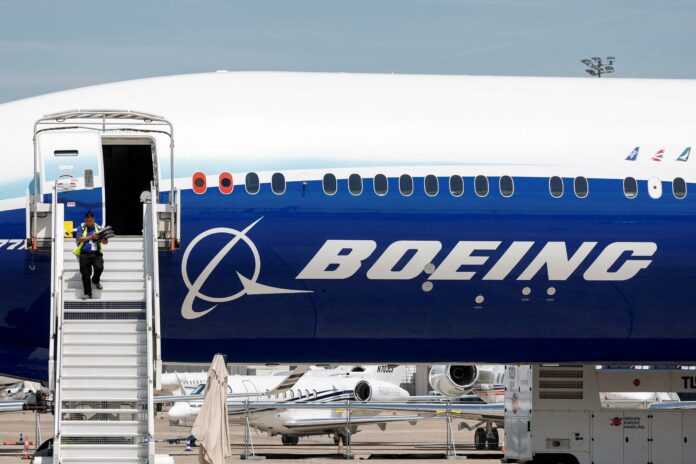Boeing Co., the aerospace giant, will begin distributing layoff notices this week to approximately 17,000 employees as part of a 10% workforce reduction announced last month. This sweeping job cut, aimed at streamlining operations and addressing financial losses, underscores Boeing’s struggle to regain its competitive edge following a series of crises, including a near-catastrophic accident earlier this year, supply chain issues, and a recent labor strike that halted production for nearly two months. However, the company faces potential risks in cutting too deeply, potentially losing skilled workers who may not return once business rebounds.
The layoffs, part of a strategic move under CEO Kelly Ortberg’s new leadership, highlight Boeing’s effort to “reset priorities” and reduce what the company views as operational bloat. Yet the timing, amid tight labor markets and increased competition for aerospace talent, could hinder Boeing’s future recovery and impact the broader aviation industry.
Skilled Labor Challenges in a Tight Job Market.
For Boeing, reducing its workforce comes with unique risks in today’s labor market, particularly in Seattle, where unemployment is at just 4% and the space sector is booming. Aerospace labor is in high demand as competitors like SpaceX, Amazon’s Project Kuiper, and Blue Origin continue expanding operations. Stan Shull, a space industry consultant with Alliance Velocity, noted over 1,350 job openings at over 50 space companies in the Puget Sound area, offering roles from engineering to machinist positions, administrative staff, and more.
This demand provides workers with alternative employment opportunities, which may result in a brain drain for Boeing, particularly as it releases skilled engineers and mechanics. Boeing’s competition in recruiting talent could intensify as it tries to bring back employees in the future. “The tight labor market is especially challenging for aerospace companies, where specialized skills are essential,” commented Richard Aboulafia, managing director at AeroDynamic Advisory. “When the workforce gets cut too broadly, it’s often the best employees who leave first, finding greater stability elsewhere.”

The staffing cuts may impact Boeing’s long-term goals as well. The company previously struggled with labor shortages and institutional knowledge gaps when it began scaling production for its 737 Max series earlier this decade. Industry experts suggest that Boeing could face similar challenges if it decides to ramp up production again without seasoned staff to train and support new hires.
CEO’s Vision of Efficiency: A Leaner Organization with “Reset Priorities”.
CEO Kelly Ortberg, who took charge in August, has introduced the workforce reduction as a key part of his plan to “reset priorities” and drive efficiency at Boeing. Ortberg emphasized during an October earnings call that these cuts aim to focus the company on essential operations, eliminating unnecessary expenses and improving productivity.
“We need to reset priorities and create a leaner, more focused organization,” Ortberg stated, outlining a vision that prioritizes consolidation in underperforming areas and reducing non-essential activities. However, the layoff announcement followed a seven-week strike that left many employees disenchanted. Although the dispute was resolved with a 38% wage hike, labor relations remain strained, potentially adding to Boeing’s challenges as it seeks to rebuild trust with its workforce.
Ortberg’s restructuring plan may yield short-term financial benefits, but Boeing’s success in implementing these changes hinges on its ability to retain top talent and prevent future labor unrest. The 10% workforce reduction might achieve cost-saving goals but could hamper long-term growth if Boeing fails to attract and retain skilled labor once the aviation sector rebounds.

Broader Impact on the Aviation Industry and Market Competitiveness.
Boeing’s decision to downsize highlights not only the company’s internal struggles but also signals broader challenges facing the aviation industry. The company’s cutbacks come at a time when the aerospace sector is navigating complex issues, including heightened global competition and a push towards more sustainable operations. By scaling down, Boeing risks losing a portion of its experienced workforce to rivals, potentially affecting its position in the market.
Additionally, these workforce reductions could create ripple effects across the aviation supply chain, from manufacturing to suppliers and service providers who rely on Boeing’s production volumes. A less robust Boeing could impact the speed and scale of aviation innovations, ultimately affecting airlines and passengers as well.
Moreover, with Boeing reducing its production capabilities, competitors may gain an edge, especially in areas like commercial aircraft production and military contracts. Rivals such as Airbus stand to benefit if Boeing’s restructuring slows its output or delays projects critical to the industry. Furthermore, the recent increase in demand for aerospace workers could allow other companies to absorb skilled labor previously retained by Boeing, amplifying the competitive landscape.
Boeing’s restructuring and workforce cuts are a gamble that may redefine its future position in a competitive and fast-evolving industry. The aviation market, already fragile from global economic pressures, is likely to feel the impact of Boeing’s recalibration as the company navigates the delicate balance between downsizing for efficiency and preparing for the eventual rebound in air travel and aerospace demand.

